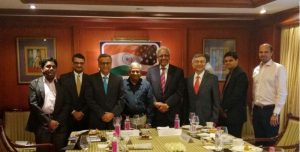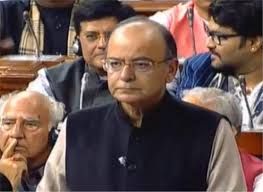http://www.freepressjournal.in/fpj-initiatives/will-budget-2017-change-the-colour-of-money/1014480
Budget 2017 — many unanswered questions

Budgets in India get dissected ad infinitum. Very often, though, the long-term thought and vision of the Finance Ministry and their subtle forward guidance is lost in the immediate impact. This time, we decided to opt for a considered view given by experienced people on specific topics. That, we thought, would help immensely in clearing the otherwise exhaustive list of developments. Free Press Journal (FPJ) along with the Indo-American Chamber of Commerce (IACC) organised a panel discussion on the impact of the Budget in specific contexts. Panelists were (in alphabetical order) Ketan Dalal, Member, India Leadership Team, PWC; Abizer Diwanji, Senior Partner, EY India; Lalit Kanodia, past president, IACC and chairman Datamatics Global Services; Jairaj Purandare, Founder Chairman, JMP Advisors; Pradeep Rath, Senior Economist, CIDCO; and Aditya Srinivas, COO and Chief Economist, BSE Brokers’ Forum. The event was moderated by R N Bhaskar, Consulting Editor, FPJ with editorial support from Pankaj Joshi.
Lalit Kanodia: It’s a pleasure to welcome all of you. I am personally very bullish about the Budget. I look forward to an intellectually stimulating discussion. So, gentlemen, let me kick this off and let me hand it over to FPJ to start the proceedings.
FPJ: Basically we want a discussion on specific issues. The first issue would be job creation in four key sectors – agriculture, infrastructure, affordable housing and financial sector. The second part of the discussion will be on taxation — corporate and business taxation. The third area for discussion would be black money and the budget. We would like to examine the loopholes that exist – like the one that has been featured in FPJ. Here we have talked about a mind-boggling and abnormally high Rs 784 lakh crore of declarations made in 2011 and 2012 that have not been pursued by the income tax department. This figure of Rs 784 lakh crore is almost four times of India’s GDP for those (2011 and 2012) two years combined.
The last point is gold, about which there was surprisingly not a single mention. Gold is important for two reasons. After demonetisation a lot of big money is going either into the dollar or in gold. Moreover, a 10 per cent duty has meant more smuggling which has its own consequences. The last part is any other topic that you think should be flagged.
So let’s get to job creation.
Jairaj Purandare: The budget actually covers and puts a fair degree of emphasis on job creation. It did not come out in the budget speech in that fashion, but I think the emphasis is there, because there is a huge focus on the infra, agriculture and rural sector.
Something like Rs 4 lakh crore investment in infra is being proposed. In railway, upgrading of systems and increasing the tracks are bound to create jobs. He talked of airport and road upgradation that is bound to trigger jobs. Why is the Finance Minister talking of this. Since private sector investment last year was actually down 8 per cent, this is the only way left for the government to trigger growth. And growth is what is needed, apart from fiscal prudence which has been well adhered to. Infrastructure will also trigger jobs in the private sector through contracts.
Allocation of Rs1.8 lakh crore in agriculture and rural sector is bound to create jobs. Here implementation is the key. Just announcement of good schemes does not mean they happen. This budget does give a fair degree of focus on creating jobs, which is the need of the hour. We need a million jobs every month in this country and the track record in the last ten years has not been great.
Aditya Srinivas: Areas like MGNREGA they are now proposing allocation of Rs 48,000 crore. This will ensure jobs in rural areas for farmers and women, which is so vital because rural areas were the largest affected by demonetisation. It is a hard fact that 70 per cent of India works on cash. When government data says that digital payments went up by 25 per cent, it is actually people like us.
While the government has always been keen on infrastructure, there has been a lack of capital because the public private partnership model has not yielded the desired result, in the first place. Second is the implementation part, where we have to ask whether the measurable objective can be implemented by the government.
From the market perspective, I can say that there was no negative in the Budget.
Ketan Dalal: The biggest issue is implementation, drilling right down to getting the right contractors, giving out the right contracts. For instance, someone was telling me that his L1 [the lowest bidder] awardee couldn’t provide required quality parameters. The second important aspect of implementation is skills. There is a very big mismatch in the quality of people we have and what we require. We need more and more sophisticated people with higher skills and that is a mismatch. This mismatch is going to be a big challenge. Hence, job creation must be clearly linked with skill development.
Also, when so much of our economy is informal, job losses in (cash-dominant) industries like diamonds, ship-breaking etc have intensified. We need one million jobs monthly but we will probably need more, because things like demonetisation and the overall transformational changes in the economy is also causing job losses.
Pradeep Rath: On employment, I would like to add that while in principle we do have employment exchanges but on the ground these facilities are hardly adequate.
FPJ: As you are from CIDCO, let me ask you on affordable housing. The estimated gap of affordable housing is 20 million as of today. If you did 2,000, 3,000 and 5,000 house and released them via a lottery, it would create a black market. When demand exceeds supply by a huge number, there will be black market. Is the government in the position to create at least 2-3 million houses every year?
Rath: For Navi Mumbai, we are planning to build 10,000 houses by 2020. Land parcels are a constraint. As far as corruption goes Real Estate Regulatory Authority (RERA) would help control it.
Purandare: To add something here, the finance minister made a comment that they expect to add one crore affordable houses by 2019. We are talking of two years. That’s a huge challenge. The biggest change done here is to recognise this as an infrastructure industry. With that, borrowing becomes easier and cheaper, and can get access to other benefits. This will result in affordable housing coming up in bigger and better way.
FPJ: Provided the government does not charge high rate for FSI.
Purandare: Of course, one of the points is that land is now auctioned and it is not cheap any more. So that is a question mark on affordable housing.
Srinivas: Getting affordable housing in tier-II and tier-III locations will benefit the common man and create local jobs. But the Budget talked of no cash transaction above Rs 3 lakh which will impact real estate and more so in smaller towns. Hence, implementation is an issue and the next is clearly the FSI. It was specified that only carpet area would be considered and it is a good thing.
Abizer Diwanji: When we talk of employment then it is MGNREGA or rural household. Are we restricted to just menial level job creation? Does it solve our unemployment problem? Reskilling is a very different concept, Ketan spoke of it. We need to reskill India to different kinds of jobs. I see this budget largely creating menial jobs, which leads me to think that is this is a populist election-related budget.
Kanodia: I would like to make a point that it is statistically proven that job creation worldwide is not by large industry, but by SME sector, which has been given a push in two ways. One is the start-ups where the FM is now talking of a three-year tax holiday as an incentive. Last time he said, three in five and if you don’t make profit. I think this should be made ten years and should be extended to profit-only companies. Second and much bigger, is the redefinition of the SME sector as having a turnover below Rs 50 crore. This is a dramatic change of thought and he had said that 96 per cent of corporates are below that level. These companies will plough back profits and generate employment. Another thing mentioned is vocational training, which will create jobs away from agricultural sector. Vocational training and urbanisation will make all the difference.
FPJ: The thrust in the budget on dairy farming is towards self-employment. Look at UP. NDDB was allowed to encourage setting up of co-operatives around Delhi, which forced the UP government to say yes to co-operatives and now farmers on the UP periphery are getting Rs 26 per litre instead of Rs 16. Combining this effect with NABARD loans, will help women in distribution of vegetables, fruits and pickles. But there is a bigger issue – the US H1B visa and then the Middle East slowdown which will mean reduced remittances. There will be people rendered unemployed, who will return to India. So where do we use these people?
The next topic – taxation and where we go?
Diwanji: Taxation is dependent a lot on tax administration. The FM can follow up and investigate everybody. However, what has this administration done in last 30 years? There is nothing in this budget which talks about how the administration is doing good.
Dalal: You are completely right. The heart of the problem is the administration which includes a variety of things. One is corruption. The next is that the law is not blind but there is the guy in the chair against whom there is not much you can do and the process of redressal is known. So there is the relevance of pre-assessment filters and time limits.
Then there are things which were expected (this Budget) or at least feared which is not good because we cannot afford distractions. There was this fear of inheritance tax. There was also a fear of tightening the rules for a non-residential Indian (NRI). There are stories of people who have opted to become NRIs to escape the tax administration in India.
I was talking to a couple of big builders who pointed out gaps in areas like the joint development agreement. In practice, the capital gains get triggered when completion happens. But that is only applicable to area sharing agreement and not to revenue sharing agreement.
Against that, the move to reduce tax rate upto Rs 50 crore is good. For non-manufacturing and non-trading businesses Rs 50 crores is a lot. However, for some strange reason, it does not apply to LLPs, but only to companies. So that is an anomaly which has to be corrected.
The last issue is the current era of outlier legislation which creates a law specifically to deal with a much lower percentage of offence. A guy crosses the road signal. So you cannot put three policemen at 2 am in the morning, you let them go. Maybe, some people are taking cash when they transfer shares of unlisted companies. You are now saying that the processing officer has the right to substitute what he thinks is the fair market value of the selling price of the unlisted shares.
So who is going to do the valuation? I have had meetings where a private equity investor and the promoter ultimately got fed up, and agreed to decide on the value. That is the way deals are done. Deals are not done by making valuation reports.
Kanodia: We are not a heavily taxed nation, but we are not a low taxed nation either. Compliance really might be improved. But we cannot reduce taxation for many reasons, mainly because the entire agri sector is out of taxation.
Purandare: For that we may need a constitutional amendment, that’s the problem. No politician wants to touch it.
Kanodia: If that window opens then a door will open to 70 per cent of the population. How do we increase return filing percentage from 3 per cent to 5 per cent? And once it goes beyond 5 per cent, rates can come down. The measures taken in taxation include one page form if return is filed for first time and no questions will be asked, is wonderful. This can increase tax net. The final pure solution is to somehow broaden the number of people or widen the number of people filing returns.
Purandare: This move of actually dropping the lowest tax rate from 10 per cent to 5 per cent can hopefully incentivise people, to declare the income and pay tax which will broaden the net. But these are small fish. What we really need is to catch some of the big fish. It’s been reported that there have been very large deposits by about 18 lakh people. Those are the ones which need to be investigated. When this government started, they spoke about less government and more governance. But many of the changes in the tax arena, whether last year or this year, they’re all heading towards more government and less governance. As Ketan said, we are just adding outliers.
Plus there is scope for misuse. Now, search and seizure can happen in situations where you suspect that there is something wrong. In such situations, you don’t have to have reason to believe. You do not have to disclose, upto the tribunal level, the source of this information. So, in legal terms the principle of natural justice has been denied, which is the right to cross-examine to talk to that source. Some fundamental things are changing here, which could possibly lead to an intrusive regime and Inspector Raj. It is more of worry than anything else. A calming influence is needed.
Kanodia: With the audit trail, a consequence of digital economy and big data kicking in, tax collection will go up anyway.
Srinivas: Tax department will actually ask people why you have made the deposit yourself. That could yet inhibit NRIs to invest here. Also, there is currently so much complexity post GST that there could be cases being filed against the government.
Diwanji: Disruption due to GST must be endured, because it will be transitional and the longer impact is better.
Dalal: The other point is the constant reference of black money and the mindset that everybody is a thief.
Purandare: I suspect there are several people out there – people who are not declaring income over 10 lakh.
FPJ: Now to the topic of corruption. The present budget has talked about various measures to prevent corruption. But a paper written earlier by the then Chief Economic Adviser – Kaushik Basu — says that if you really want to stop corruption just make sure that the bribe giver is not criminalised. You need bribe givers to complain. How else will you be able to create a history of incidents? If bribe givers are to be penalised, nobody will complain.
Rath: As a Chief Vigilance Officer, in such a case, I suspended the employee as well as sent the bribe giver to judicial custody. In the Corruption Act, the giver and taker both are criminals.
FPJ: That is what needs to be corrected.
Purandare: This is a topic which is going to take a long time. This government at least has shown the will and the direction to take steps against corruption and black money. How far they are successful? We can debate. But at least the process has begun. I think we should recognise that corruption is not going to disappear overnight it is a generational change that will happen. Are we moving in the right direction? I think, yes.
Diwanji: I think we have started in the right direction. I think demonetisation more than curtailing currency, has actually curtailed a lot of entrepreneurship that they have in their minds. I think everybody got scared which is a good thing.
Purandare: It’s good to have a little bit of fear and tension, but in democracy you don’t want predominance of fear.
Dalal: Can I make three points on corruption? The first is about government officials who mostly get relatively lower monetary compensation, but very high perks. There is no point in paying a State Bank Chairman Rs 42 lakh and giving her Rs 260 crore house. She can afford only two-bedroom flat. So rise in remuneration is important.
The second is a digital interface. They are talking of video meeting because face-to-face meeting can cause or increase corruption. The next is again checks and balances related to pre-assessment filters and internal approvals. The GAAR is a wonderful provision, but could be misused. They said you cannot invoke GAAR till you take the consent of an approving panel with high court judge. The officer needs to write a letter now to the high court person.
Diwanji: What about corruption in real estate, by far it’s the biggest element apart from the bureaucracy. Real estate is all about the time value of money. More the time is stretched; the higher is the cost of the rent seeker — whether it is for approvals or land allocations. Everything is discretionary.
If you go anywhere else in the world, clearances take place upfront. Look at India, for example the Bhendi Bazaar case. There is law of eminent domain. Eminent domain basically says where there is public good involved you can litigate but you cannot stay. Here, out of the 350 buildings in Bhendi Bazaar, if one building decides not to give it up, what will you do? He may take Rs 100 crore and someone else who co-operated would get Rs 2 crore. Now to pay Rs 100 crore the system has to be managed again.
So I focus on real estate, where there is a lot of inflow of cash and hence a lot of outflow of cash. First there has to be a plug on cash inflow, including from investors who also are not much interested in white money.
FPJ: Now the last question. Post demonetisation, there is a tendency on the part of high net worth individuals to park unaccounted money in dollars or in gold. One view is that gold is better for the country than dollars because gold strengthens our country’s reserves. Your views.
Purandare: If you have your savings in gold which a lot of Indians have done traditionally means it is not in the financial system. On the other hand, whether you have it in dollars or whatever, the currency is being used in the economy. So there is one very significant method to support investment in a currency rather than in gold. Gold does back up your reserves but that is a government matter. Indians already have hundreds of tonnes of gold.
FPJ: 25,000 tonnes.
Diwanji: We have a $2 trillion economy and 30 per cent savings. Then, why do we need FDI? This is because hardly 15 per cent of the $600 billion savings goes into productive assets like stock markets or mutual funds. Most of it is held in a physical asset like property and gold, which is essentially an unproductive asset. Again, in this budget I did not see any big thrust on moving the savings into productive assets, into the system on the financial side.
Purandare: Savings are not being channelled into the economy for the growth of economy — that is the sad part.
Diwanji: This whole budget is about government spending. If you look at the whole economy and the whole budget, there is no way that there is transmission of money to the real economy. And what is required is transmission of money to the real economy.
One, we have a banking system which has Rs 3 lakh crore required for current BASEL III standards and another estimated Rs 3 lakh for the incremental standards.
Purandare: He has given Rs10, 000 crore for us.
Diwanji: So, we need Rs 5, 90,000 crore more and not to bail out defaulters but to actually rejuvenate assets which are stalled. There is just so much asset to be sweated and existing capacity to be utilised. If you talk about roads and people getting contracts how can EPC companies execute a single contract unless they get capital. Frankly, I did not see anything in the budget which propels private investment. Today, you have Rs 5 lakh crore of demonetisation savings, move it to the real economy.
Dalal: Link it to ‘Make in India’.
Diwanji: Here PARA (restructuring bad loan bank) is not the answer. The answer is sweating the asset. Differentiating between troubled and malafide stressed assets. In the name of fraud you stop all restructuring. Also, the problem is that we want to give it to somebody else, but on the same debt level as they exist today, which is not going to happen.
One good point is the bankruptcy code which is the privatisation of the BIFR. Earlier there were some official sitting there who was going to approve a plan, who was a government official and it did not matter how it ran. Now it is going to come into private sector, there is going to be an insolvency professional, who will come and resolve it.
The point is simply that we need to give in more of our resources to the real economy and the banking system where it is. The banking system grew 9 per cent and we want an economy which has got 7% per cent growth. The growth of banking system has to go up by 15 to 20 per cent for our economy to grow.
FPJ: So the fact is that sweating assets brings everything into mainstream.
Dalal: Focusing on FDI, of all the FDI which has come in, including private equity, I feel 80-90 per cent is secondary market deals and no incremental capital.
FPJ: In that connection can I ask you one question. You see FDI has slowed down and during conversations with various foreigners, they said they do not want to invest in India because one of the biggest issues is the absence of protection for foreign investments. The government wants to dilute even existing protection under the bilateral investment treaties (BIT). What are your views?
Dalal: This Vodafone case is one such example.
Diwanji: Then there is the bad name because of the bilateral investment treaties. It makes people feel uncomfortable.
Purandare: You can’t go for international arbitration.
Dalal: From my practical experience, the large players like ABB, Siemens etc, have already come. Now awaiting are the second-rung companies of Germany or Switzerland or leaders from smaller nations like Croatia. They also want to come in but they are just scared. What is our ease of doing business? Our definition is that we merely reduce unease and we think it is ease.
Kanodia: You are right. Our rank is 175. You should be in the top 10.
Purandare: There is a huge issue in terms of stability, certainty and knowledge of outcome. You can’t enforce a contract in India. If there is a fight between a foreign partner and Indian partner, resolution will take years in Indian forum. So, no foreigner will put money till there is clarity on the BIT.
Kanodia: Look at the mindset of India, where the businessman is not given due recognition. Of the 45 Bharat Ratnas, only one went to a businessman, which is JRD Tata. We don’t recognise their contribution.
FPJ: Is there any other issue that you want to raise about the budget?
Dalal: There is a ridiculous provision called income disclosure standards. You make your accounts based on general accounting standards that should be the starting point of your tax, subject to depreciation and amortisation. In data metrics for example what is the point of time you should raise the bill on the customer is there in the economics.
Purandare: True, the notion of taxing real income is being departed from several instances and the classic example is house property income. Even if you have not rented it, there is a notional income which is being taxed and not making the income. This government is talking of simplification, removing exemptions and simultaneously reducing the rates of tax. One big disappointment has been reduction of taxes for MSMEs but no tax reduction for corporates. He announced reduction of corporate tax from 30 per cent to 25 per cent in 2015. This is the third budget he has presented after that. So I would have expected him to take some steps in that direction.
Diwanji: We have a 3.2 per cent fiscal deficit whereas our fiscal responsibility parameters allow for 3.5 per cent currently. The differential is Rs 50,000 crore coming into the economy. This money put in the real economy through the banking system means a multiple of 4x. So it is Rs 2 lakh crore coming into the system and being invested. By doing that, we would have had a better chance of stabilising 6 per cent-7 per cent of GDP growth than just by sticking to a 3.2 per cent deficit. Everyone asks why did you move from 3 per cent to 3.2 per cent? I think we should move to 3.5 per cent. The rest of the world has done that and have run on fiscal deficits but deployed them well.
Purandare: The budget just made a passing reference to divestment or strategic sale. This disinvestment is expected to raise around Rs 72,000 crore. When you talk of all the spend and what is going to fund it, then it is the expected divestment; an estimated 15 per cent growth in direct taxes; and 6 per cent growth in indirect taxes, mainly on the back of demonetisation and GST.
Kanodia: One point he made was focus on eradication of tuberculosis, which means acceptance of a problem. He also said in passing that they will list all the PSUs. That would make them more accountable. While these are far down the road, they have been mentioned.
Purandare: But steps have been taken in terms of moving towards the more transparent, less corrupt, less cash, less black money economy. I think these are good steps. I like one statement which he made yesterday, that this will change the colour of money.
FPJ: Thank you gentlemen. It was a wonderful discussion indeed.






































COMMENTS